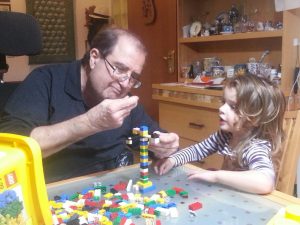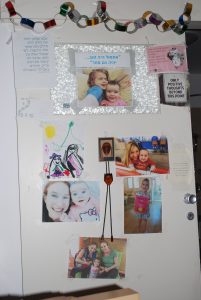Bench-pressing a Buick and other Strengths
Bench-pressing a Buick and Other Strengths
Ten Tips to Getting Through a Medical Crisis
On May 10, 2014, we entered a long, dark tunnel, after a careless driver rammed head-on into Arik’s car as he was taking his mom home. In the aftermath, we found ourselves clinging to the tunnel walls with every light in the distance presaging another oncoming train. You can read some of the details, in my blog post “Of Almonds and Analgesics.” Suffice it to say it included several departments at two different hospitals for both Arik and his mom. And since Arik is already a wounded warrior, well, use your imagination to fill in the blanks.
My usual blog is filled with biblical references. This time, I’m keeping it to one: “consider the ant” (Prov. 6:6). When you get to the end of this blog, see how the ant I filmed helped me interpret those words. Wow, did she know a thing or two about bearing a burden.
It’s been 28 months, two surgeries and several crises since the accident and Arik is on the road to recovery. I hope others in our situation, working toward recovery, will find these ten tips helpful. But don’t think we consistently did the things on the list below – most are things we wished we had done, or done better.

I don’t know who first said this, but it went right on our “encouragement wall” (see below)
- Vent
Tell everyone who’ll listen what happened – family, neighbors you know and those you don’t, friends near and far. It helps. One of my friends said I complain all the time, and another one said I don’t complain enough. Both were true. But stoic, silent suffering – definitely out.
- Connect and Delegate
Reach out for practical help! Among the above mentioned neighbors, friends, family etc., find the experts – especially those with either professional or personal experience – to rely on for advice. And among them find people your beloved patient feels at home with who can provide comfort and/or casseroles, do errands and even spell you for a few hours.
- You know yourselves best
Do you want visitors? If so, make sure you tell people to come – some won’t know otherwise. I posted on our community Facebook page, and it worked! But you’ll have to be able to set limits. For 18 months or so, Arik was only allowed to be up for two hours a day. That was hard when he was having a good time with friends. Caregiver: you might have to be the sergeant at arms.
- Speak up
As a long-time paraplegic, Arik knew he should have been more insistent when asking about external fixation for his broken legs. But it was a short trip from the emergency room to the operating room on the night of the accident, and we weren’t exactly focused. Sure enough, there they were sticking out of his legs the next morning. That led to other complications. The nurse’s cheerful announcement the day after the fixations were installed that he could “get up and sit in a chair today!” was somewhat ironic, as he’s been sitting in a chair (a wheelchair) for 42 years.
- Acquire your own expertise
We can’t all invent Lorenzo’s Oil. But I would never have found Dr. Moti, the plastic surgeon who cared so skillfully for Arik’s pressure sore and brought him back from quite a dangerous place, if not for Google. And when you find an expert, don’t be afraid to cold-call him/her. Seeking out online support groups is one of the many pieces of good advice given by Constance Gustke in her recent New York Times article, “Love and Burnout” about the risk of caregiver burnout.
- Bite your tongue
You’re closer to the patient than anyone. Mostly that will put you directly in the line of fire of your patient’s frustration and anger (and him/her in yours). Remember, they don’t mean it. One day, maybe after a long night in the emergency room or after a long wait for the home-care nurse, Arik said to me: “@#$*$#^#&@!.” Well, you can imagine, that was unacceptable, and so I said right back: “#^%*%**@#^$%~@+!” What a toxic waste of energy for both of us.
- Say what you think
That might seem like a contradiction with No. 5, but the boundaries of civility have got to be maintained. Someday he/she will get better, and you don’t want too much to be sorry for. If your beloved patient exceeds those boundaries, tell them. Just try not to say: “#^%*%**@#^$%~@+!”
- The new normal
At some point around the end of month 14, things began to look particularly bleak for moi, the caregiver-spouse, what with the daily bandaging, a full-time job (thankfully, I was able to work from home), grandmother stuff, cooking and serving three meals a day to the patient, etc. Even with the help of Lea, the incomparable caregiver the Israeli government provides Arik as a wounded warrior, some days it seemed like too much. Our family doctor referred me for a talk with our community social worker. “This is your new normal. You have to make a new contract,” she said. And that’s what we did. It doesn’t have to be written out or even spoken. But it does have to be the goal.
- Baby steps – don’t knock them
On the road to recovery, “small” achievements are so important: On our first Hanukkah after the accident Arik wanted to make latkes and he did! As a writer I know I should use more exciting verbs than “make” and “wanted.” But after spending most of the first 8 months in bed, making latkes is a wonderful achievement. So is building Lego with your granddaughter and a million other little things we take for granted.

Month 8 of recuperation; enjoying everything important in life at that moment.
- Ommm….
As a caregiver stress is a constant companion. Send it packing by doing whatever works for you: prayer, meditation, reading Psalms, exercise, breathe, walk, run, swim, watch NatGeo Wild, the waves or the sunset. This is not pampering; it’s essential for your health; as Gustke pointed out, caregivers can suffer from a weakened immune system and the results can be disastrous. I didn’t really know what whooping cough or pleuritis even were…until I got them. One thing I liked for us to do is focus on the pictures of family and words of love on the encouragement wall I placed opposite Arik’s bed.

Our encouragement wall opposite Arik’s bed. Sometimes it helped just to focus on the messages we placed there.
- Tomorrow
In our situation, where recovery was a matter of months – oops, we thought it was going to be months, now we’re more open-ended in our expectations – at the end of the particularly bad days, I try to close the day by sharing with Arik what became one of our most valuable, and empirical, lessons: Tomorrow will be better.
And now, as promised, below: click on the clip and consider… the ant


Wow and thank you! Rverything is relative and this really puts “our” two spine surgeries in perspective. I think the moment for a trip to ירושליים is approaching. Lots and lots of love to you both. עליזה and Søren
Way to press on and persevere, “ant” Miriam. Those are beautiful words of encouragement.